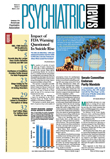Although one in four veterans returning from Iraq and Afghanistan who visit a Veterans Affairs (VA) medical center receives a diagnosis involving mental health, better diagnostic tools are still needed to evaluate these troops, a prominent researcher told the House Appropriations Subcommittee on Defense in Washington, D.C., in January.
“Thirteen percent of the 100,000 first visits were diagnosed with PTSD,” said Charles Marmar, M.D., vice chair and professor of psychiatry at the University of California, San Francisco, and associate chief of staff for mental health at the San Francisco VA Medical Center. “Those diagnoses were made by clinicians in face-to-face diagnostic interviews, usually in primary care.”
Marmar noted that on this occasion, he was not speaking on behalf of the Department of Veterans Affairs since his remarks had not been cleared by the department.
Marmar was the main psychiatric witness before the committee. He reported on a study (in press with Archives of Internal Medicine) of more than 100,000 veterans of warfare in Iraq and Afghanistan. The committee room was so crowded that Capitol police turned away latecomers.
Rates of PTSD in this group were roughly similar to those of veterans of the Vietnam War, but there was one “striking” difference, he said. The present wars have seen a marked rise in traumatic brain injuries, largely due to roadside bomb explosions and motor vehicle accidents, along with gunshot wounds.
“Unfortunately, these closed head injuries are the same kind of events in the same settings that are likely to lead to terror and horror, which trigger posttraumatic stress,” he said. “So the two occur together, creating a kind of double jeopardy.”
Furthermore, the military and medical systems for veterans may be missing many head-injury cases, said Marmar. Troops with major wounds are routinely screened for closed head injury, but those who have minor wounds, or have briefly lost consciousness but recovered, are not. One of the lessons provided by the experience of Vietnam veterans was the need for “early and aggressive identification and treatment of PTSD” among the current generation of troops. More extensive clinical interviews based on current research and still-undeveloped biological markers would increase the reliability of diagnoses.
Elsewhere in the Capitol, the House Committee on Veterans' Affairs began its work after an intraparty fight among the new Democratic majority. Former ranking member Lane Evans (D-Ill.), who stepped down for health reasons, had thrown his support behind Michael Michaud (D-Maine) as the new chair, but Michaud lost out to Robert Filner (D-Calif.). As a result, Filner dismissed several of Evans's former staff members, including those who worked on subcommittees overseeing veterans' benefits and health care, according to a former staffer. Some veterans groups felt that the changes would mean the loss of extensive institutional memory about veterans' health issues, especially mental health. Filner's new staff director, retired Army Lt. Col. Malcolm Shorter, has experience working in Congress but not on veterans' issues.
Michaud will chair the subcommittee on veterans' health, however. Two of the former staff members moved to jobs on the Senate side of the Capitol, and some veterans groups said that leadership on veterans' health issues may go with them. ▪
